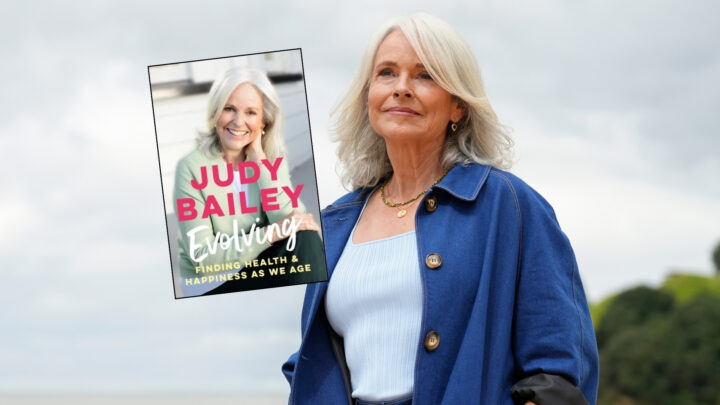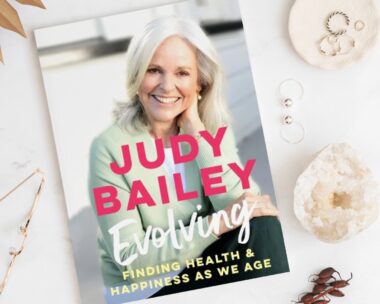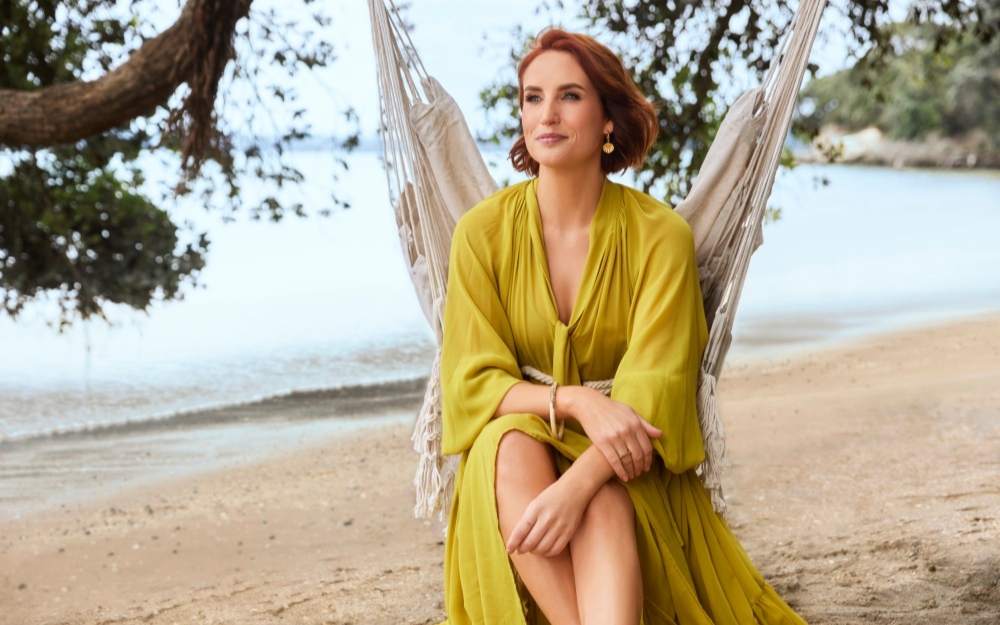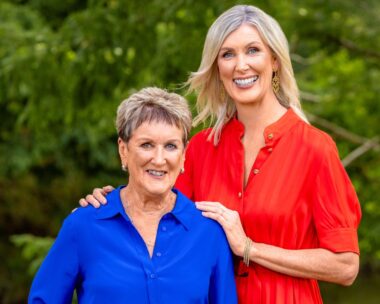The other day, my friend Stella, an effervescent 70-year-old, asked me, “What is your definition of ‘old’?” I struggled to come up with an answer.
“Pick an age,” she encouraged.
“Well … maybe 90?” I offered.
“So, 20 years older than we are, then?” she said. We laughed about it because it’s so true, isn’t it? Particularly as we pass middle age. In a way, it really is as good a definition of “old” as any: 20 years older than you are at any given moment!
As I write this now, I definitely don’t feel old. A little more grown-up than I once was, perhaps, but not necessarily old. Even at 94, my mum, bless her, would often tell me she still felt “24 inside”, and I know what she meant. On the inside, she was essentially still the same person. A lifetime of experiences had shaped her and outwardly she’d changed, but she was still Dinny Morrison.
She still had the same sense of humour, the same love of life and family, the same anxieties, the same basic needs. It didn’t really make much difference whether she was 94 or 24. Or rather it shouldn’t have made much difference. But now that I’m into my seventies, I know it does make a difference. I find my advancing age inescapable. Gloomy? No. That is precisely what I don’t want to be about the inevitability of age. Growing older is a blessing, one so many don’t get to experience. After all, I hope to have 20 or even 30 good summers left in me and I don’t want to waste them!
However, as those of us unceremoniously lumped into the amorphous category of “old” know all too well, there’s a lot more to ageing than how you feel on the inside. There are also all the ways things on the outside are changing – and I’m not just talking about your looks. Yes, there are the signs you spot when you look in the mirror. I like to put a positive spin on these ones. “I’ll never look better,” I think as I peer into the magnifying mirror in the bathroom. Optimistic and also true… The wrinkles will eventually win! And that mirror, of course, turns every one of them into a giant chasm. Mind you, I couldn’t do without it or I’d end up wearing my lipstick in my eyebrows.
But there are other changes too. Ones that have to do with the way you’re seen by the world, the way you’re treated. Ones that started popping up for me back when I was in my early fifties. I was still working as a news anchor then and ahead of the bulletin one night, I was reviewing a story about an “elderly” woman who had been attacked.
“How old was she, exactly?” I asked the young reporter. “Oh, about 50,” came the breezy reply.
How bloody depressing! I’d apparently skipped middle age and gone straight to “elderly” without even realising it.
Yes, the “old” thing sneaks up on you when you least expect it.
All of a sudden, pharmacists and supermarket staff are speaking very slowly and loudly to you, you get the senior discount without people checking first, police officers and doctors really do start to look like children, and everyone assumes you don’t understand technology. And then the day comes when a shop assistant decides to call you “dear”. This one also started happening to me in my fifties. These assistants no doubt mean well, but their “dear” I certainly am not! Honestly, it sets my teeth on edge and makes me want to reach over the counter and throttle them. Am I overreacting? If so, I’m not the only one.

“When people in grocery stores call me ‘dear’,” 80-year-old Tess, one of the many older people I interviewed for this book, told me, “I feel like picking them up by the collar and letting them dangle. I just reply, ‘Thank you, sweetie.’”
And don’t even mention the R word. That one started creeping into conversations when I left TVNZ at the age of 54. “So,” everyone kept asking, “how are you finding retirement?”
“I’m not retired,” I would reply. “I’m just not working in television any more.”
What was it about the word “retire” that I so loathed? Probably that it made me feel as though, because I wasn’t on air any more, I didn’t have anything to offer. I felt surplus to requirements, dismissed. Not paid, therefore not productive. Honestly, I still don’t much like the word. Just hearing it makes me feel instantly tired and less-than. Look it up in the dictionary and you’ll see it means to withdraw, retreat, call it a day, go to bed. Sometimes when I hear it, I want to say, “Okay, if that’s what you think, I’ll hit the sack and pull the covers over my head.”
Again, I’m not the only one. “I have never liked the word ‘retirement’,” Serena Williams told Vogue when she announced she was stepping away from professional tennis in late 2022. “I’ve been thinking of this as a transition … Maybe the best word to describe what I’m up to is evolution. I’m here to tell you that I’m evolving away from tennis, toward other things that are important to me.”
I love that. Indeed, “evolving” is what we’re all doing, all the time. We move from one stage of life into another, just as the butterfly emerges from the chrysalis. Ageing is no different. Our later years should be some of our best – the stats tell us our eighties are the happiest years of our lives, for those of us lucky enough to make it that far. Yet so many of us dread older age. Why?
The ageing process is a minefield. It’s sobering, getting old. You start to sense your own mortality. Life suddenly telescopes. You begin to think seriously about the time you have left. It can be a period of great uncertainty. Many of us grapple with the very real worries of losing our lifelong partners, finding ourselves alone, experiencing physical and mental decline, lacking a sense of purpose, becoming invisible. I’ve lost count of the number of people who’ve told me they feel “invisible” because of their age – according to New Zealand’s Office for Seniors/Te Tari Kaumātua, it’s 20 per cent of people over 50. And it seems to happen especially in shops. “You can be standing there for ages at the counter and no one seems interested in helping you,” 73-year-old interviewee Patti told me. “I can only imagine the shop assistants are shortsighted. If only they realised the amount of disposable income going begging!
And you do begin to feel just that little bit vulnerable. That vulnerability comes, I think, from what we’re told about ageing. So much of it is negative: we’ll be frail, dependent, impoverished. A drain on the health system, on society. A burden. This is ageism and it’s just as toxic as every other -ism out there. It’s the idea that people become somehow inferior just because of the number of years they’ve lived.
In 2020, the Centre for Better Ageing in the UK released a report that noted in particular how “women’s ageing is often seen more negatively than men’s”. Although older women might be stereotyped as supposedly being nice things like moral, polite and empathetic, we’re simultaneously deemed less competent. We are treated with a general lack of respect. Society tends to display a kind of benign indifference towards us. Perhaps that explains why Tess and I so despise being called “dear”.
Gerontologist Dame Peggy Koopman-Boyden says a lot of older people assume they’ll be given respect, but they also have to earn it. “Never refuse an offer of help from a younger person without saying, ‘Thank you.’ Be respectful yourself – if you’re on the bus standing, say, ‘Excuse me, would you please give me your seat? I’m a bit wobbly.’”
Ageism cuts both ways – it can also be directed at people for being “too young” – but when it’s targeted at older people, it results in people fearing getting old. It causes us to be ashamed of our age, rather than proud of and grateful for it. But it doesn’t have to be this way. We need to change the way we think about old age. Instead of fearing the inevitable, let’s start looking forward to the evolution.
Get in the draw to win a personally signed copy of Evolving by Judy Bailey today.
Evolving by Judy Bailey (HarperCollins New Zealand) is in-store early April.
 Photography by Robert Trathen
Photography by Robert Trathen


